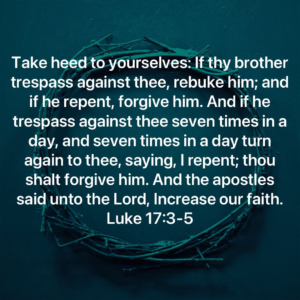(Preaching the Word Commentary) Responsible to Forgive

Luke 17:1-5 (KJV)
Always Forgive (Matt. 18:6,7,21,22; Mark 9:42)
1 Then said he unto the disciples, It is impossible but that offenses will come: but woe unto him, through whom they come!
2 It were better for him that a millstone were hanged about his neck, and he cast into the sea, than that he should offend one of these little ones.
3 Take heed to yourselves: If thy brother trespass against thee, rebuke him; and if he repent, forgive him.
4 And if he trespass against thee seven times in a day, and seven times in a day turn again to thee, saying, I repent; thou shalt forgive him.
5 And the apostles said unto the Lord, Increase our faith.
The duty to rebuke is attached to the responsibility to forgive: “and if he repents, forgive him. If he sins against you seven times in a day, and seven times comes back to you and says, ‘I repent,’ forgive him” (vv. 3c, 4). The duty to forgive becomes increasingly personal. “If your brother sins [against a “little one,” or if a “little one” sins] . . . and if he repents, forgive him.” Then, more personally, “If he sins against you seven times in a day, and seven times comes back to you and says, ‘I repent,’ forgive him” (emphasis added). The idea is that after the initial rebuke and your granting forgiveness, if he again sins, and again sins, and so on, the matter becomes highly personal. His sin is increasingly against you.
But regardless of the personal nature of the offense and the repetition of the offense, if the other person repents, you are to forgive him. This forgiveness is, to cite the adjectives used by various commentators, “boundless,” “total,” “immeasurable,” “limitless,” “habitual.” Jesus places the burden of responsibility on the person forgiving rather than on the person who is repenting. The benefit of the doubt goes entirely to the one being forgiven. This raises immense practical difficulties. What about hypocritical requests for forgiveness? What if the sins being repented of repeatedly hurt others? Obviously there are some qualifications. Nevertheless, “Jesus’ teaching does identify in sharp contours what genuine forgiveness is all about” – upon whom the burden lies and the extent of forgiveness. It is better to be willing to forgive seven times a day even though the “brother” is not sincere than to refuse to forgive a truly repentant soul and thus place a stumbling block in his way.
This is difficult stuff. We must rebuke sin, even though we do not want to; and we must forgive sin, even though we do not want to. But obedience in these matters is sublime, because to do so is to become more like God. He always stands against sin in perpetual rebuke, and yet he also delights to forgive repentant sinners. His forgiveness is limitless. Has not God forgiven each of us countless times? All with such a spirit have become like God.
Download the OLIVETREE APP and start using their resources https://www.olivetree.com